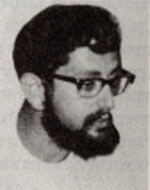Pecula, Yehuda-Leib (Julian)
Yehuda, son of Frida and Joseph, was born on July 15, 1951 in Melbourne, Australia. He studied at a Jewish elementary school in his hometown and then continued to study, as did his brother Avraham and his sister Sarah, at the Lubavitch high school in Melbourne, with Rabbi Gruner. At the end of his studies, in 1970, he immigrated to Israel at the age of nineteen. Yehuda grew up in the center of an active and vibrant Jewish community that was proud of its Jewishness and nurtured it. The Melbourne community is famous for its adherence to Jewish values, traditional Jewish life, and its warm and open sympathy for Zionism and the State of Israel. Thus Judah was educated as a religious Jewish youth, in his parents’ home and within his community. In addition to the extensive Jewish education network, the community also maintains a number of Jewish newspapers, synagogues and other cultural and social activities that are unique to it. It is therefore not surprising that the boy who grew up and was educated on the admiration of Zionism and the love of the State of Israel nurtured one dream: to immigrate to Israel and to fulfill in his body the principles and values that he grew up and educated on. Immediately after completing his studies, he immigrated to Israel and came to the Hebrew studio of Kibbutz Sde Eliyahu. Yehuda absorbed very quickly in Israeli society and the language difficulties disappeared after he had spent a few weeks in the studio. Because he was cheerful and open-minded, he quickly became fond of everything and became a householder in many of the members’ houses. In the studio he was among the best students who managed to acquire the new language without suffering and with joy. He used to encourage those who were hard-pressed and discouraged, and would not allow anyone to speak out against the country, despite the difficulties they faced. He was the most ardent advocate of the Zionist movement and used to emphasize achievements and to minimize the value of difficulties and omissions. His parents, who came for a brief visit with their son, were Simcha with his quick and successful recording in Israel. The dream of their lives – to see their son living in a Jewish society and being educated in an atmosphere of the Land of Israel – was realized before their eyes. After completing his studies in the ulpan, Yehuda moved to the city to taste the life of the city of Israel. This period is still strong in his consciousness, that his future should be related only within the framework of working settlement. He joined the Yachdav group of his movement in order to establish his future at Kibbutz Sde Eliyahu when he enlisted. Yehuda was drafted into the IDF at the end of January 1971 and volunteered for the paratroop brigade. After basic training, he underwent a retraining course for the Armored Corps and completed his studies as a tank driver. At first, the army’s life was very difficult for him, but slowly he adapted to the difficult life of training and activity and even began to enjoy his achievements. He did his agricultural work in the kibbutzim Masua and Ma’ale Gilboa, where he specialized in tractors and agricultural processing. For hours he worked in the southern parts of the valley, steadily, with dedication and without fatigue. With great joy and pride he would return at the end of the hard day’s work, sit with his friends and tell about his work. He wanted to return to his beloved friends and immediately became absorbed in the social life of the kibbutz, and he began to participate in the activities of his group’s drama club, and there was no party or event that Yehuda’s hand did not help His life in the Sde Eliyahu farm was so appealing to him that he began to plan to build his home and set up his family on this kibbutz.The war, which broke out a few months before the end of his compulsory service, In the Yom Kippur War, Yehudah took part in the battles to repel the Egyptian forces on the coast of the Suez Canal. On the tenth of Tishrei (06/10/1973) Judah fell in battle. In the context of the peace treaty with Egypt, his body was allowed to be returned from the “dock” post and to on September 19, 1979, he was laid to rest in the military cemetery on Mount Herzl in Jerusalem. After his fall, he was promoted to corporal.
